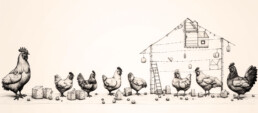
Session 3: Play
Embracing play
Rather than a single audio mix, I’m offering an unmatched pair for this session. The first is a mainstream voice on a mainstream platform—a TED talk by Tim Brown, chair of the influential design firm IDEO, who takes our theme head-on.
In my experience it can be surprisingly difficult for many adults to allow themselves to truly play. We have so many inner voices, internalized over decades, that try to call us back to “productivity.” So I’m also offering a kind of reframing of creative play as a profoundly serious and wonder-full act, and I’m offering that reframing through poetry.
First, a two-minute introduction
Here’s Charlotte Fox Weber, a psychotherapist and author of Tell me what you want: A therapist and her clients explore our deepest desires, saying a few things about play.
Poetry of creating in complexity
(This mix was originally created for students in the MFA in Design for Social Innovation at the School of Visual Arts.)
It can be difficult to say “yes” to an invitation to play. When we let go of the idea of creativity as a kind of industrial process, a straight-line conceive-plan-execute activity, it can feel that we are left with no guides. How do we proceed?
When we let go of the idea that we already understand some slice of life well enough to get right into the carpentry of “solutions,” it can feel overwhelming. As we turn our full open attention to the world, it’s just so… MUCH!
This session’s theme is “Play.” It’s an invitation to recover a way of open creative conversation with the world that doesn’t care if you’re feeling lost (what else would we expect?!), doesn’t care if we’re not sure (what else would we expect?!).
Where the world’s complexity has been a source of overwhelm, it becomes a source of discovery and surprise, a bottomless well for our curiosity. Where our own uncertainty has made us feel inadequate, it can make us feel in contact with something huge and awe-inspiring. The same complexity can paralyze us or engage us in wonder.
Poetry can give us language for the experience of complexity, and it can give us practical and hopeful frames. Here are some thoughts on that, with plenty of poems.
Use the download button on the right side of the player to get the mp3 file,
for listening on your favorite device.
CONTENTS
Introduction: Complexity brings us to our edge
David Whyte notes that our identify is most real in the conversation where “who we think we are” meets the world as it is.
Part one: Wonder – 3:07
Gregory Orr’s poems invite us to a certain kind of attention toward the world.
Part two: Creating in complexity is participating in unfolding – 10:13
Working with A.R. Ammons’ poem, Poetics
Part three: Lost – 19:00
After an introduction from Sonja Blignaut, David Whyte helps us consider David Waggoner’s poem, Lost
Part four: Trust – 31:40
With so much uncertainty, where can we put our trust? We hear three answers from David Whyte, Mary Oliver, and Pierre Teilhard de Chardin
Closing with O’Donohue – 44:06
A poem so short you can memorize right now.
“Music”
Audio samples gathered by Marc Rettig over the years.
